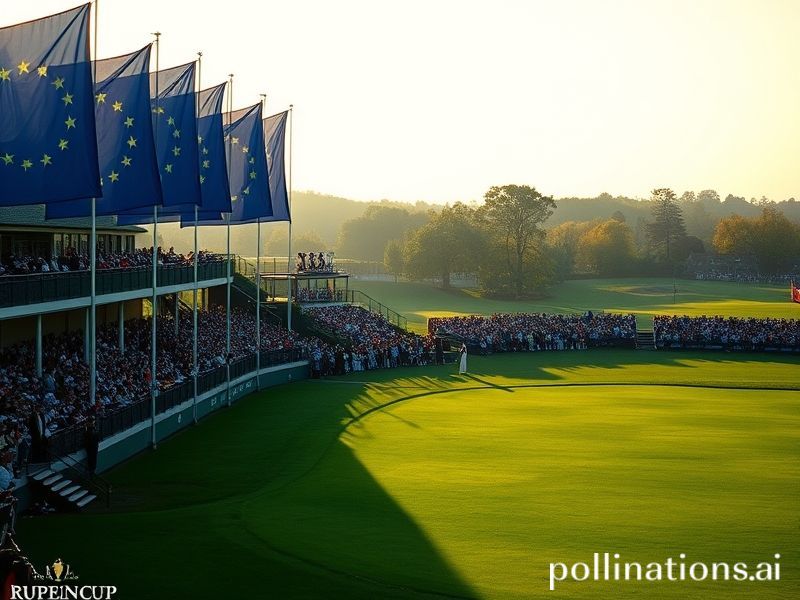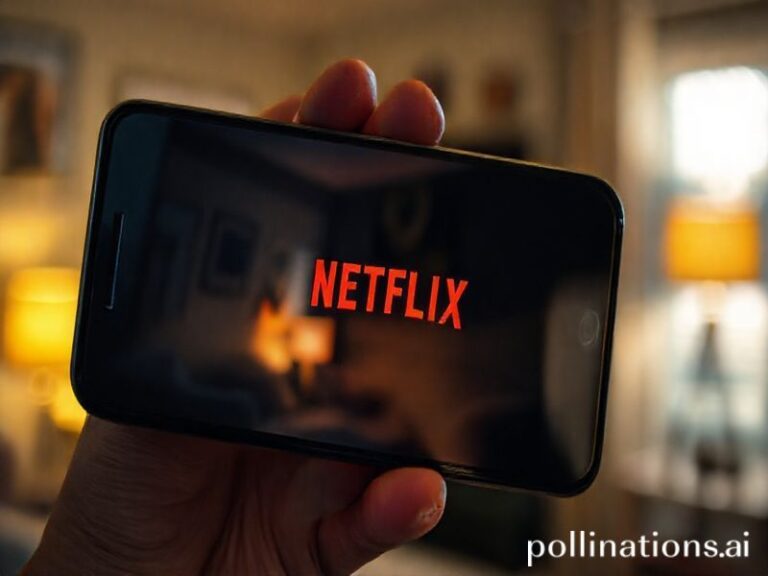The 2027 Ryder Cup Lands in Paris: Golf, Geopolitics, and a Side of Existential Dread
Adiós, 2025. Bonjour, 2027. The Ryder Cup caravan—equal parts golf, geopolitics, and open-bar diplomacy—has packed its tartan trousers, its corporate hospitality tents, and its barely concealed existential dread, and is now rumbling toward the Île-de-France like a Brexit refugee with an expense account. Where the 2025 matches in Bethpage felt like a Twitter pile-on with sand traps, the 2027 edition at Le Golf National outside Paris promises to be a subtler form of blood sport: continental schadenfreude served with foie gras and a side of Eurozone anxiety.
For the uninitiated, the Ryder Cup is the biennial transatlantic grudge match in which twelve men per side pretend it’s still 1985 and try to thwack a small white sphere into a slightly larger white cup while wearing outfits that scream “I summer in Nantucket” or “my accountant summers in Nantucket.” The prize? A 17-inch gold chalice that spends most of its life in a safe in Virginia and, for the winners, the right to lecture strangers on clubhouse verandas about “team culture” until the next apocalypse, or 2029—whichever comes first.
Global significance? Please. We live in an era when sovereign debt yields and submarine cables move faster than a Bryson DeChambeau drive, yet somehow three days of match-play golf still manage to wobble currency markets. Every time Rory McIlroy holes a putt, the euro edges up 0.003% on the vague belief that European morale might translate into higher German factory orders. Conversely, when an American rookie lips out, futures traders in Chicago mutter “soft power deficit” and dump Boeing. Yes, the algorithms have learned to hedge against human emotion; no, we are not okay.
The host venue itself is a monument to such absurdities. Le Golf National’s Albatros course was built in 1990 on a former beetroot field, proving that France can gentrify anything—even dirt—into a Michelin-adjacent spectacle. In 2018 it staged the most lopsided European victory since Napoleon’s early résumé lines, and the locals have been dining out on the memory ever since. Expect 2027 to be no different: the French will offer the world a masterclass in hauteur, handing out baguette-shaped tees and staging nightly wine tastings where the only acceptable American vintage is “apology.”
Ticket demand is already stratospheric. A hospitality package currently costs the GDP of a small Baltic republic, but purchasers receive a commemorative NFT of the 16th green that will be worthless the moment their phone battery dies. Corporate sponsors—bespoke Swiss private banks, Gulf-state airlines in search of reputational SPF 50, and at least one cryptocurrency exchange that will file for bankruptcy between now and opening ceremony—have erected marquees the size of Liechtenstein. Inside, executives will discuss “ESG-compliant birdies” while their jets idle on the tarmac, burning enough fuel to melt the polar ice cap that their slide decks claim to be saving.
And then there’s the matter of geopolitical subtext. With the U.S. distracted by its own democratic stress test and Europe busy rearming its vocabulary, the Ryder Cup has become a rare arena where the West can still agree on the rules—provided nobody mentions climate reparations or semiconductor tariffs. Captaincy picks will be scrutinized like Supreme Court nominees; a single errant Instagram like from 2014 can torpedo a career faster than a shanked wedge. Meanwhile, China watches from the fairway rough, quietly wondering whether the Belt and Road Initiative needs a putting green.
Will the matches matter in the cosmic ledger? Absolutely not. But for 72 holes spread over three autumn days, the planet will pause its usual descent into entropy to argue about foursomes pairings, as if the correct answer might somehow refinance Italian debt. And when the final putt drops—likely in near darkness because TV demands prime time in California—half the globe will cheer, half will groan, and the cup itself will be passed around like the last bottle of Château Pétrus before the next recession hits.
Golf, like democracy, is mostly about pretending the numbers on the scorecard still add up to something noble. See you in Versailles-adjacent suburbia, 2027. Bring a sweater; the forecast calls for scattered hope with a 90% chance of existential drizzle.







